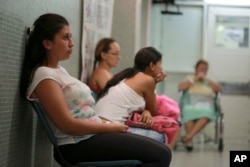One day after Zika funding failed in the Senate, U.S. lawmakers heard a sobering assessment of the virus' potential to do harm and America's lack of preparedness to fight the mosquito that carries it.
The deputy director of the Centers for Disease Control and Prevention, Anne Schuchat, noted that more than 500 pregnant women in the United States have contracted Zika, and the number is certain to rise.
"We need the states to be able to detect, respond [to] and prevent infections," Schuchat told the Senate Homeland Security Committee on Wednesday. "We need to strengthen surveillance for the disease and for mosquitoes. We need to do everything we can to control the mosquitoes."
Many U.S. states, however, lack a coordinated mosquito eradication program, according to the head of the American Mosquito Control Association, T. Wayne Gale.
"Especially for those states that don't have any existing programs, you can't stand up [create] mosquito control infrastructure overnight," Gale said, adding that keeping mosquitoes in check is labor-intensive and equipment-intensive, and training staff for new programs across the country takes time.
Focus on contraception
Senators also heard unsettling new medical data concerning the virus, which few researchers had focused on prior to last year.
Christopher Zahn of the American College of Obstetricians and Gynecologists noted that the risk of a congenital heart defect in a newborn is about 1 percent, but the risk of a Zika infection causing a birth defect like microcephaly is 13 percent or higher.
With no vaccine on the immediate horizon and America's mosquito season well underway, Zahn said, "The only guaranteed way to prevent [Zika birth defects] is contraception. So access to contraception both domestically and abroad is crucial to address this issue."
Access to contraception became a central point of contention in the Senate debate leading up to Tuesday's vote blocking the $1.1 billion to fight Zika.
Democrats objected when a majority of Republicans inserted cost offsets that included a cut in funds to Planned Parenthood, a major provider of birth control to women.
"Women are concerned about birth control," said Minority Leader Harry Reid, a Nevada Democrat. "For a majority of young women, [Planned Parenthood] is the only place they have to go [for contraceptives]."
Republicans argued that Democrats bear the blame for scuttling Congress' last opportunity to act on Zika before both houses adjourn for next week's Independence Day holiday.
"Families don't want excuses. They want action," said Majority Leader Mitch McConnell of Kentucky. "In the midst of mosquito season, Democrats chose partisan politics over $1.1 billion in critical funds to protect pregnant women and babies from Zika."
Vaccines and funding
University of Wisconsin pathologist David O'Connor said he is confident a Zika vaccine will work, but that developing one and demonstrating its safety and efficacy will take time.
"The vaccines still need to be tested, first for safety in small numbers of people. Then, they need to be tested in small and in large efficacy trials," O'Connor said. "And those studies are going to be particularly difficult to do in pregnant women, because it's going to be difficult to want to expose pregnant women to the risk of a vaccine [where long-term health effects have not been ruled out]."
Schuchat said CDC funding currently exists for small-scale studies, but not large ones.
"That's one of the reasons that additional resources are needed," she said.
With no vaccine and only a patchwork of mosquito-control programs across the United States, many Americans may choose mosquito repellent as a primary defense.
H. Fisk Johnson, CEO of S.C. Johnson & Son, America's biggest bug spray manufacturer, told senators that the company is tripling production of repellent.
"We are truly gearing up to be able to supply the worst-case scenario if it comes to that," Johnson said.



